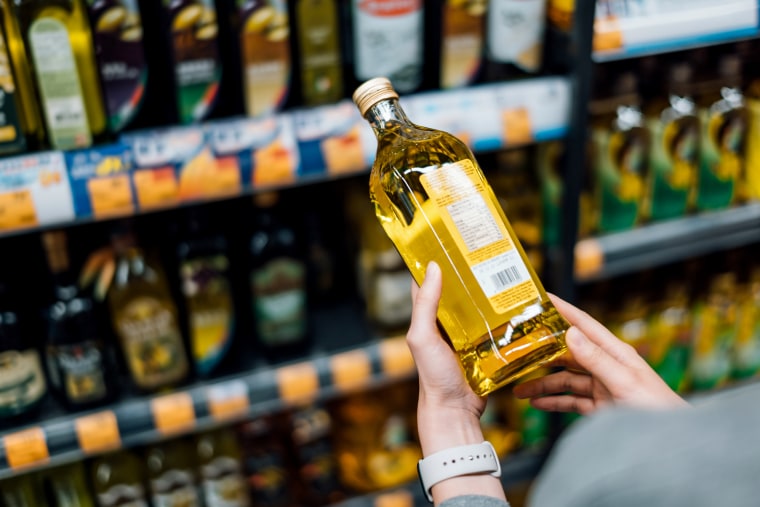Olive oil is one of the most nutritious and disease-fighting foods on the planet. It is considered a healthy monounsaturated fat containing multiple bioactive compounds. These compounds provide high amounts of polyphenols and potent antioxidant activity. However, with so many options to choose from at the grocery store, it’s impossible to know which option is best for your shopping cart and your health.
Regular consumption of extra virgin olive oil may provide multiple health benefits.
1. Extra virgin olive oil may reduce the risk of dying from disease.
Research in 2022 Journal of the American College of Cardiology Consuming at least 1/2 tablespoon daily was found to reduce the risk of death from neurodegenerative disease, heart disease, respiratory disease, and cancer.
2. Extra virgin olive oil is a super fuel for your brain.
A Temple University study found that when mice ate a diet enriched with extra virgin olive oil, they performed better on tests of memory and learning, and improved synaptic connections between neurons in the brain. Other studies have shown similar benefits for brain health.
3. Extra virgin olive oil is the enemy of chronic inflammation.
A recent meta-analysis of randomized controlled trials evaluated the effects of regular dietary intake of olive oil on three inflammatory markers: C-reactive protein, interleukin-6, and tumor necrosis factor-alpha. Regular consumption of extra virgin olive oil improved all three functions. Additionally, two studies found similar mechanisms in extra virgin olive oil and ibuprofen. A study in the Journal of Neuroscience found that a compound in extra virgin olive oil called oleocanthal is responsible for both its anti-inflammatory effects and the pungent taste that often causes coughing when consuming sources containing high phenolic compounds. Another study also showed the role of oleocanthal as a potent anti-inflammatory agent. These studies identify olive oil as a natural source of NSAIDs that may be a potential therapeutic option for chronic inflammatory diseases.
4. Extra virgin olive oil may play a role in reducing cancer risk.
Multiple studies have shown that the same compounds found to reduce inflammation may also play a role in cancer cell death.

How to choose the right olive oil
The olive oil industry is not without controversy and not all olive oils are created equal. A 2020 study broke down the essential ingredients of high-quality olive oil.”
How do these guidelines translate to your grocery store aisle? Here are some tips for buying the best quality olive oil.
- Choose only extra virginLook for labels that indicate the oil is “extra virgin.” This means that the olives have not undergone any chemical treatment to extract the oil. The extra virgin label also means that the olives were cold-pressed (or cold-pressed first).
- Select option to reveal harvest dateAlthough not required, the date of harvest gives a lot of information about freshness and quality. Most oils also have a “use by” or “best by” (for unopened bottles) dates to provide guidance based on when the oil was bottled. Indicates when the olives were removed from the olive tree and harvested. Early or first harvest means that the olives were pressed before they were ripe. Often the most expensive, but early or first harvest yields the best tasting and highest nutritional quality options.
- Choose your olive production area carefully. Country or origin indicates where the olive was harvested. It will also show if the olive is from a single place or from multiple places, choose oils that have only one country of origin he. This brings the entire process from harvesting to pressing to bottling in one place.
Bottles and timing of use are important for maintaining quality
Light, heat and oxygen degrade taste and quality. Dark-colored glass bottles (or bottles with UV-protected glass), metal or opaque cans, ceramic bottles with dispensers, or stainless steel are all good options for maintaining quality.
All fats go rancid, so you should consider that exposing olive oil to air, heat, or light is ticking the clock. , it is recommended that the oil be purchased within 18 months of the date of harvest. The fresher the oil (as indicated by the date of harvest), the higher the polyphenol activity.
What can consumers look for to ensure quality?
Although certification is voluntary, it helps ensure that the olive oil is of the highest quality in harvesting and processing. Quality certification is granted by the California Olive Oil Council, North American Olive Association. You can also look for labels that indicate mills or estates. Many small factories and farms provide sufficient information on their websites about their individual processes to ensure quality.
How to use olive oil
Studies show that consuming at least ½ to 4 tablespoons daily is key to longevity. The more often, the greater the profit can be. Olive oil can be drizzled over vegetables and toast, or used as a finisher for grain dishes. It is also commonly used in whole grain and bean-based pastas. Cooking with olive oil is a great way to increase nutrient density and enhance flavor. Vegetable and animal proteins can be sautéed, used in chocolate making and baking. You can drink a spoonful as it is.
Olive oil may help you live longer. Incorporating it into a healthy diet is easy. Now you have the tools you need to choose the best option.
